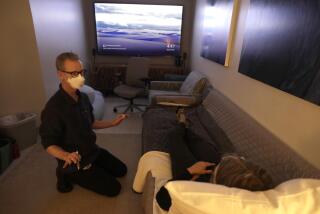Breast Implant Panel Accused of Conflict
- Share via
Attorneys for thousands of women claiming they were harmed by silicone gel breast implants charged Tuesday that a physician on an influential court-appointed panel reviewing implant safety data had inappropriate dealings with a company that once made the devices.
Citing a possible conflict of interest, plaintiffs’ attorneys asked a federal judge to dissolve the nationally prominent expert panel and throw out its widely publicized December report exonerating the implants of a significant role in chronic disease.
The motion was filed in the U.S. District Court in Birmingham, Ala., which is overseeing consolidated lawsuits against three former implant makers. The move comes as panel members were planning to give videotaped depositions in court next week that could be used as expert testimony in implant lawsuits nationwide.
Plaintiffs’ attorneys charge that panelist Dr. Peter Tugwell, a rheumatologist at the University of Ottawa, Canada, had several undisclosed contacts with defendant Bristol-Myers Squibb that compromised the panel’s independence. He would not comment on the pending litigation.
The company asserts that the dealings were minimal, proper and had nothing to do with the silicone breast implant issue, but pertained to arthritis treatments.
“His contact in no way would have influenced his findings or the science panel’s findings on silicone breast implants,” said company spokeswoman Jane Kramer. Fewer than 6,000 women have cases pending against the company out of the original pool of 24,000, she said.
At issue is the neutrality of the four-member National Science Panel, appointed by Judge Samuel C. Pointer in 1996. After two years, the panel reported it had found no consistent evidence for the claim that silicone implants caused significant conventional or atypical chronic illnesses. Some legal scholars hailed the panel’s work as a new model for dealing with lawsuits based on complex and disputed scientific evidence.
In the motion to disband the panel and overturn its findings, plaintiffs’ attorneys say Bristol-Myers Squibb paid Tugwell a $750 honorarium to discuss arthritis medications at a medical meeting last November, that he asked the company in 1997 to support a rheumatology conference, and that he signed an agreement with the company last December to be involved in an arthritis drug study at his hospital.
The motion alleges that Tugwell did not disclose the contacts to the judge overseeing the panel as required, adding to “an appearance of impropriety,” attorney Robert Gordon said.
More to Read
Sign up for Essential California
The most important California stories and recommendations in your inbox every morning.
You may occasionally receive promotional content from the Los Angeles Times.












